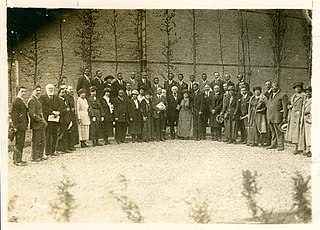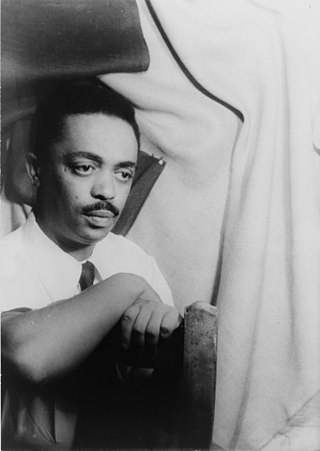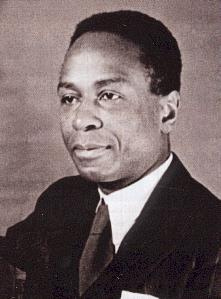Related Research Articles

The national flag of Ghana consists of a horizontal triband of red, yellow, and green. It was designed in replacement of the British Gold Coast's Blue Ensign.

The Pan-African Congress (PAC) is a regular series of meetings which first took place on the back of the Pan-African Conference held in London in 1900.

Peter Henry Abrahams Deras, commonly known as Peter Abrahams, was a South African-born novelist, journalist and political commentator who in 1956 settled in Jamaica, where he lived for the rest of his life. His death at the age of 97 is considered to have been murder.

Pan-Africanism is a worldwide movement that aims to encourage and strengthen bonds of solidarity between all indigenous peoples and diasporas of African ancestry. Based on a common goal dating back to the Atlantic slave trade, the movement extends beyond continental Africans with a substantial support base among the African diaspora in the Americas and Europe.

George Padmore, born Malcolm Ivan Meredith Nurse, was a leading Pan-Africanist, journalist, and author. He left his native Trinidad in 1924 to study medicine in the United States, where he also joined the Communist Party.
Joseph Emmanuel Appiah, MP was a Ghanaian lawyer, politician and statesman.

Raphael Ernest Grail Armattoe was a Ghanaian scientist and political activist. He was nominated for the 1948 Nobel Peace Prize and was a campaigner for unification of British and French Togoland. He was called by the New York Post "the 'Irishman' from West Africa", and the BBC producer Henry Swanzy referred to him as the "African Paracelsus".

Hakim Adi is a British historian and scholar who specializes in African affairs. He was the first African-British historian to become a professor of history in the UK when in 2015 he was appointed Professor of the History of Africa and the African Diaspora at the University of Chichester, launching in 2018 the world's first online MRes in the History of Africa and the African Diaspora.
Ernest Eggay Kwesi Kurankyi-Taylor was a prominent Ghanaian judge and activist.
Ladipo Solanke was a political activist born in Nigeria who campaigned on West African issues.
The West African National Secretariat ('WANS) was a Pan-Africanist organisation founded by Kwame Nkrumah, based in Britain.
The West African Youth League (WAYL) was a political organisation founded by I. T. A. Wallace-Johnson in June 1935. The group was a major political force against the colonial government in West Africa, especially in the Gold Coast and Sierra Leone. The League was the first political movement in the region "to recruit women into the main membership and the decision-making bodies of the organisation".
The International African Service Bureau (IASB) was a pan-African organisation founded in London in 1937 by West Indians George Padmore, C. L. R. James, Amy Ashwood Garvey, T. Ras Makonnen and Kenyan nationalist Jomo Kenyatta and Sierra Leonean labour activist and agitator I. T. A. Wallace-Johnson. Chris Braithwaite, was Secretary of this organisation.

Postcolonial international relations is a branch of scholarship that approaches the study of international relations (IR) using the critical lens of postcolonialism. This critique of IR theory suggests that mainstream IR scholarship does not adequately address the impacts of colonialism and imperialism on current day world politics. Despite using the language of post-, scholars of postcolonial IR argue that the legacies of colonialism are ongoing, and that critiquing international relations with this lens allows scholars to contextualize global events. By bridging postcolonialism and international relations, scholars point to the process of globalization as a crucial point in both fields, due to the increases in global interactions and integration. Postcolonial IR focuses on the re-narrativization of global politics to create a balanced transnational understanding of colonial histories, and attempts to tie non-Western sources of thought into political praxis.

The Sons of Africa were a late-18th-century group in Britain that campaigned to end African chattel slavery. The "corresponding society" has been called the Britain's first black political organisation. Its members were educated Africans in London, including formerly enslaved men such as Ottobah Cugoano, Olaudah Equiano and other leading members of London's black community.
T. Ras Makonnen was a Guyanese-born Pan-African activist of Ethiopian descent.

The First Pan-African Conference was held in London, England, from 23 to 25 July 1900. Organized primarily by the Trinidadian barrister Henry Sylvester Williams, the conference took place in Westminster Town Hall and was attended by 37 delegates and about 10 other participants and observers from Africa, the West Indies, the US and the UK, including Samuel Coleridge-Taylor, John Alcindor, Benito Sylvain, Dadabhai Naoroji, John Archer, Henry Francis Downing, Anna H. Jones, Anna Julia Cooper, and W. E. B. Du Bois, with Bishop Alexander Walters of the AME Zion Church taking the chair.
Dorothy Pizer or Dorothy Padmore was a British working-class anti-racist activist, secretary and publishing worker. In the 1940s and 1950s she was the partner, supporter and collaborator of Pan-African activist and Communist George Padmore.
The history of African Americans in Ghana goes back to individuals such as American civil rights activist and writer W. E. B. Du Bois (1868–1963), who settled in Ghana in the last years of his life and is buried in the capital, Accra. Since then, other African Americans who are descended from slaves imported from areas within the present-day jurisdiction of Ghana and neighboring states have applied for permanent resident status in Ghana. As of 2015, the number of African American residents has been estimated at 3,000 people, a large portion of whom live in Accra.
Bankole Awoonor Renner was a Ghanaian politician, journalist, anti-colonialist and Pan-Africanist. Considered to be the first Black African to study in the Soviet Union between 1924 and 1927. Awoonor-Renner was also the first African to be accredited to the Institute of Journalists in London, becoming editor of the Gold Coast Leader.
References
- ↑ "Black and Asian Britain" - Seminar Series at ICwS, 2012–2013, Institute of Commonwealth Studies.
- ↑ Sherwood, Marika (September 1998). "Billy Strachan (1921–1998)". Black and Asian Studies Association Newsletter (22): 31–32.
- ↑ Shapiro, Stephen (1 June 2008). "Review: After Abolition: Britain and the Slave Trade Since 1807". origins.osu.edu. Ohio State University. Retrieved 29 August 2018.
- ↑ Gayle, Damien (29 September 2017). "UK university censors title of Holocaust survivor's speech criticising Israel". The Guardian . Retrieved 29 August 2018.
- ↑ Baynes, Chris (29 September 2017). "Manchester University censors title of Jewish Holocaust survivor's speech criticising Israel". independent.co.uk. Retrieved 29 August 2018.
- ↑ "Search results - Contributor: Marika Sherwood". Oxford Dictionary of National Biography. Oxford University Press. Retrieved 18 May 2020.
- ↑ "Historian's tale of an African's journey to Kent", Faversham Times, 22 June 2012.
- ↑ Erica Taylor, "Little Known Black History Fact: Albert Makaula", BlackAmericaweb.com, 5 June 2012.
- ↑ David Killingray (2011), "Origins of Pan-Africanism. Henry Sylvester Williams, Africa, and the African Diaspora", The Journal of Imperial and Commonwealth History, 39:2, 348–351.
- ↑ Whittall, Daniel (2011), "The imperial African - Review of Origins of Pan-Africanism: Henry Sylvester Williams, Africa, and the African Diaspora, by Marika Sherwood (Routledge, ISBN 978-0-415-87959-0, 354 pp." The Caribbean Review of Books).
- ↑ Sherwood, Marika, After Abolition: Britain and the Slave Trade Since 1807, I. B. Tauris Publishers,
- ↑ Martin, Guy. 2005. "Pan-African History: Political Figures from Africa and the Diaspora since 1787 (review)". African Studies Review. 48 (1): 214–217.
- ↑ Heywood, Linda. 2005. "BOOK REVIEWS - Pan-African History: Political Figures from Africa and the Diaspora since 1787". The International Journal of African Historical Studies. 38 (1): 117.
- ↑ Vinson, R. T. 2005. "Pan-African History: Political Figures from Africa and the Diaspora since 1787, by H. Adi and M. Sherwood : book review". Unisa Latin American Report. 21 (2): 113–115.
- ↑ Killingray, David. 2004. "Pan-African History: Political figures from Africa and the diaspora since 1787, edited by Hakim Adi and Marika Sherwood. London: Routledge, 2003. 203 pp. ISBN 0-415-17353-1 (paperback)". African Affairs. 103 (412): 496–497.
- ↑ Bourne, Jenny (2001), Claudia Jones: a life in exile (Review), Race and Class, v.42, no.3, 2001 January–March, p. 105 (ISSN: 0306-3968)
- ↑ Ceesay, Hassoum (9 November 2007). "Book review | Kwame Nkrumah: The years abroad, Marika Sherwood, Freedom Publications, 2005". The Daily Observer'. The Gambia.